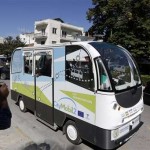 I’ve written previously about some of the interesting innovations taking place in urban transportation, and especially in how buses operate. For instance, the Finnish startup Kutsuplus, which allows users to pick both their own routes AND summon their own buses.
I’ve written previously about some of the interesting innovations taking place in urban transportation, and especially in how buses operate. For instance, the Finnish startup Kutsuplus, which allows users to pick both their own routes AND summon their own buses.
Or you have Bridj, which hopes to make the commute more productive. Bridji operate a shuttle service that hope to offer commuters a more enlightening way to get to work. As with most things these days, the service is driven via a mobile app, through which users can select their desired pick up and destination points, their time of travel and to reserve a seat on the bus.
Driverless buses
With advances in driverless technology happening at such a pace, it’s perhaps no surprise to see a driverless bus as the next stage in bus innovation. The Greek town of Trikala are trying out just that however.
The project is using French built CityMobil2 buses and the trial will run until the end of February. The buses have already been put through their paces in controlled traffic conditions in places such as La Rochelle (France), Lausanne (Switzerland), and Helsinki in Finland. The initial trials all went smoothly with no incidents, so the next stage is to ramp things up a bit.
Greece is renowned for its hilly and winding streets, and the roads are often awash with impatient drivers and zippy bike riders. In other words, it represents a thorough test for the driverless technology.
The government amended its laws to allow the testing to commence, with a dedicated bus lane added for the trial.
Early stages
Suffice to say, the buses still look and feel very different to traditional buses, with a 10 seat capacity and a maximum speed of 20kph. The hope is that the Trikala is another step on the road to driverless buses becoming more mainstream however.
“There were cities bidding for this project all over Europe. They offered relatively restricted urban areas. But we said we could make it happen in a downtown environment and we won,” the project team say. “We have a 2.4-kilometer (1.5-mile) route, the bus route. It’s mixed with traffic, with pedestrians, with bicycles, with cars … That hasn’t been done before.”
Whilst the buses will be fully automated, they will nonetheless have a driver in the control center that can step in if things go wrong.
“It’s as if they are in here and they can stop the bus if they want to, if something goes wrong,” the team say.
At the moment, the buses are running without passengers whilst the team wait for a faster fiber-optic network to be completed to allow quicker data transmission.
With personalized route planning becoming more accepted, together with driverless technology, it is certainly an interesting time for public transport in our towns and cities.
As I’ve written about earlier this week, I suspect the next stage will be to phase more automation into the vehicles we already have, before then becoming fully automated further down the road.
Would you be happy to ride in a driverless bus? Let me know your thoughts in the comments below.
Hmm, I must say this makes me nervous. Cars are one thing, but buses up the ante significantly. It's a thorough test of the technology mind you.
You'd imagine that if this kind of technology can survive in somewhere as broken as Greece then it could thrive anywhere!
Trouble is when we automate away all of these jobs is that robots don't spend money or earn money to spend. Who buys the goods they make then? Redundant, unemployed and skint humans? A road to nowhere.
I actually think that the day robots can do all or most work without the help of humans is the day that the case for massive redistribution of wealth and means of production becomes unanswerable. In economic terms, we'd be in a "post-scarcity economy" and we'd inevitably move towards socialism.
My 8yo said with glee that once all cars are self driving there will be no speed bumps.